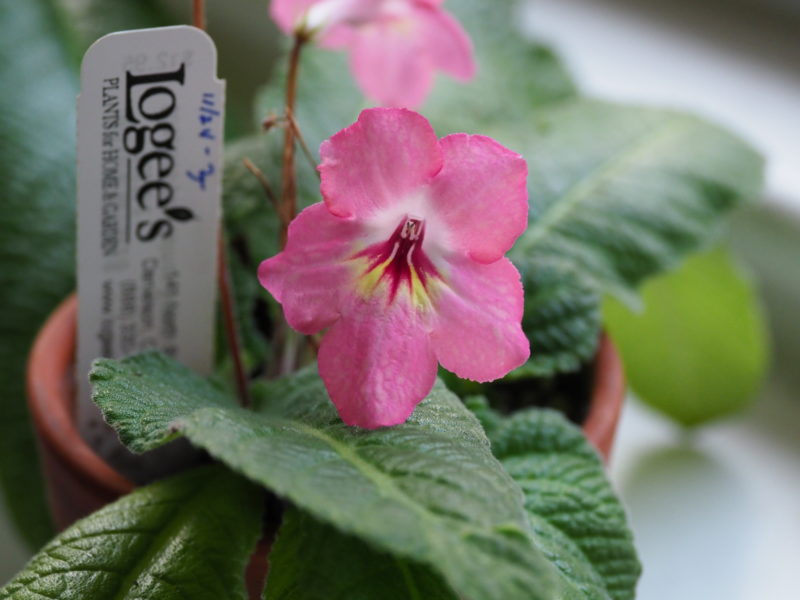

Time to start gift shopping for your favorite gardener.
One of the most inexpensive and yet useful things I’ve gifted myself is a set of bottle top waterers (kinsmangarden.com). Long ago I had purchased a watering bulb, also called a watering syringe, at Harrods in London. It was just like a basting bulb but larger with a plastic extension and an end piece similar to a watering can nozzle with tiny holes. The bulb deteriorated over the years, making it difficult to water seed trays and seedlings without doing damage.
I’d remembered seeing these bottle top waterers on the counter in a garden center and hunted them down. These bottle waterers come in two hole patterns (fine and medium) which are perfect for seed flat watering as well as the delicate emerging seedlings. Simply find a plastic bottle (on the small size) that the cap fits on and you’ve got just what you need. They make a great stocking stuffer, and since they’re so inexpensive (about $6 for four) get several, and keep one set for yourself.
Gardeners tend to be particular about their tools, so it can be difficult to buy a tool as a gift, but here are some thoughts. You can rarely go wrong with a Felco pruner. Felco is among the best in the world, and they go for a premium. I use a Felco #2 pruner and find that it fits my hand well, so the ergonomics of this one work for me. There are several styles, including pruners for the left-handed and those wanting longer handles for fruit tree pruning. The #2 sells for about $55 and you can find it locally and online. There are knockoffs, but they are not nearly as sturdy.
In addition to the Felcos being well built, you can replace nearly every part on them, so they can last for years and years. Springs, blades, gears are all available as well as tools to sharpen them, and these can make great stocking stuffers. Make sure you know the model number you need parts for, as they may not be interchangeable.
When we get to larger hand tools like shovels and spades, there are a number of things to look for. If you spend $100 or more on a shovel, spade or fork and it doesn’t feel good because of a poorly designed handle or it’s too heavy, it simply won’t get used. I prefer wooden shafts to steel or fiberglass and metal parts that are forged and not stamped. The shaft should be riveted into a sleeve and not just jammed into the shaft. “D” handles tend to be more useful than “T” type handles. Bulldog makes a great line, and you can get a set of their border spade and fork for about $150. These should last a lifetime — but if they don’t, the handle and shaft are replaceable.
Keep in mind that a shovel is not a just shovel and a fork or hoe is not just a fork or hoe. There are different designs for different purposes. If you’re not sure what the tool will be used for, look for a general use tool. I have a collection of shovels, spades, hoes, rakes and forks. All get used. Shop online at amleo.com or at local garden centers.
In the book department, Allan Armitage (known for “Garden Perennials”) has recently published a new edition (the fourth) of “Herbaceous Perennial Plants.” Armitage is not without some controversy in the horticulture world, but his breeding work over the years and his university research, as well as his vast knowledge of perennial plants, certainly make his books nearly a must-have in the gardener’s library. Available as a paperback ($80), the book may be in short supply but is available from the publisher by using this link: bit.ly/3fBTvzM. A hardbound edition is also available, but you’ll have to search for that or use this link: bit.ly/3l9z7Y5.
Gift certificates can be great deals as some are discounted for the holidays, but make sure there is either no time limit on those cards or that they are at least good through the 2021 gardening season. For vegetable gardeners on your list, there’s Renee’s Garden (reneesgarden.com) and Johnny’s Selected Seeds (johnnyseeds.com). Renee’s has the most incredible seed packets and interesting kitchen garden selections, while Johnny’s has an impressive catalog and wide selection of organic vegetable seeds.
For the gardener who likes to explore and take some risks, there’s Plant Delights, Tony Avent’s nursery (plantdelights.com). The Plant Delights catalog is one that is often saved for years and even has a wonderful dose of humor. Swan Island Dahlias (dahlias.com/gift-card) is the place for any gardener wanting more varieties of dahlias than you can imagine. And for interesting trees, shrubs and peonies, there’s Klehm’s (songsparrow.com). When it comes to plant quality, it’s hard to beat Klehm’s.
I have two recommendations for smaller plants: Bluestone Perennials (bluestoneperennials.com) has a large selection of the more common perennials at reasonable prices, and Graceful Gardens (gracefulgardens.com) has annuals and perennials (great delphiniums) in large cells. For greenhouse plants, houseplants and exotics, there’s no place like Logee’s in Connecticut (Logees.com). Here you can buy small plants (usually shipped overnight since they’re so close), especially tropicals, not found at most garden centers as well as a selection of perennials and shrubs.
Don’t forget our feathered friends. Birds give me so much joy in the garden and from my window. They can be encouraged to hang around the garden and landscape by feeding them at the right time of the year with the right foods and the right feeder. A gift of the right bird feeder can be priceless and lead to hours of enjoyment for adults and kids. Feeders are somewhat seed specific as a thistle feeder won’t do sunflowers and a suet feeder is only good for, you guessed it, suet. Suet is the best way to feed many woodpeckers, nuthatches, wrens, titmice and others.
There are feeders that are truly squirrel-proof, but they are costly. On the other hand, they may pay for themselves on seed saved for the birds, not the squirrels. Many of our local garden centers have staff who can help you select the right feeder and suggest the right food to get started.
Another gift suggestion for older (but any) gardeners is a kneeling pad. These are usually oval and about 12 inches wide and 18 or so inches long, foam and lightweight. They prevent our older knees from resting on hard soil or stones, thus softening the passive impact. I can’t garden without one and since I invariably misplace one, I have two. These pads seem to come in various firmnesses making them as hard to pick out as a new mattress. Overly soft ones may allow for too much compression and less knee protection while rock hard ones seem to miss the point. In the two pictured, the one on the right is medium-firm and seems just right.
Take care of your favorite gardener at the holidays. You may reap the rewards at harvest time. Keep growing.
On mornings when you see frost on the lawn or when you know the lawn is frozen, it’s a good idea not to walk on it. If the lawn is frozen, even just down a few inches, and the sun softens the top of the sod as you walk on it you’ll leave depressions that can snag mowers and also leave brown spots in the spring.
When putting up bird feeders remember that the seed will be scattered by the birds and rodents. This can lead to birdseed “weeds” showing up in the spring, especially if you use sunflower seeds and the chipmunks bury them up to 500 feet away when they emerge next year.
While the soil is still soft, it’s time to get those driveway and walkway markers in. Also, stock up on sand for traction and ice melters for those critical places where you need safe footing. Never use salt around plant materials. Other ice melters are better, but not great. Sand with a small amount of calcium chloride — small being the key word — can work well. Keep in mind that various ice melters work best at certain temperatures.
Many tree companies will do tree work in the winter for less than it might cost in the summer. The work can be easier in some cases, and they need to keep their crews busy. Negotiate if you can.
Order seeds and plants for next year. Seeds will arrive quickly while plants will be shipped in the spring but at least you’ll get them.
 More Posts from Andrew Messinger
More Posts from Andrew Messinger